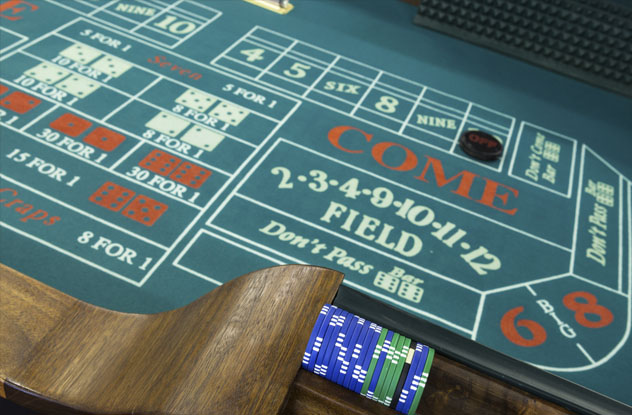 Weird Stuff
Weird Stuff  Weird Stuff
Weird Stuff  Health
Health Ten Confounding New Inventions from the World of Biomedicine
 Creepy
Creepy 10 Death Superstitions That Will Give You the Creeps
 Movies and TV
Movies and TV 10 Movies That Get Elite Jobs Right, According to Experts
 Weird Stuff
Weird Stuff 10 Times Real Laws Were Based on Bizarre Hypotheticals
 Animals
Animals 10 Inspiring Tales of Horses Being Human
 Mysteries
Mysteries Top 10 Haunting Facts About the Ghost Ship MV Alta
 History
History 10 Surprising Stories About the Texas Rangers
 Humans
Humans 10 Philosophers Who Were Driven Mad by Their Own Theories
 Miscellaneous
Miscellaneous 10 Video-Game-Worthy Weapons and Armors from History
 Weird Stuff
Weird Stuff 10 Warning Labels That Exist Because Someone Actually Tried It
 Health
Health Ten Confounding New Inventions from the World of Biomedicine
 Creepy
Creepy 10 Death Superstitions That Will Give You the Creeps
Who's Behind Listverse?

Jamie Frater
Head Editor
Jamie founded Listverse due to an insatiable desire to share fascinating, obscure, and bizarre facts. He has been a guest speaker on numerous national radio and television stations and is a five time published author.
More About Us Movies and TV
Movies and TV 10 Movies That Get Elite Jobs Right, According to Experts
 Weird Stuff
Weird Stuff 10 Times Real Laws Were Based on Bizarre Hypotheticals
 Animals
Animals 10 Inspiring Tales of Horses Being Human
 Mysteries
Mysteries Top 10 Haunting Facts About the Ghost Ship MV Alta
 History
History 10 Surprising Stories About the Texas Rangers
 Humans
Humans 10 Philosophers Who Were Driven Mad by Their Own Theories
 Miscellaneous
Miscellaneous 10 Video-Game-Worthy Weapons and Armors from History
10 Crazy Huge Gambling Wins
Professional Gambler Phil Ivey banked $9 million in April 2014, but his was hardly the first or largest major win. Though the house has a substantial edge, a few gamblers have been able to strike it big.
10The Tragedy Of The Big Megabucks Hit

Cynthia Jay was a cocktail waitress at the Monte Carlo casino in Las Vegas. On January 26, 2000, while celebrating her future mother-in-law’s birthday, Jay took a shot at the Megabucks slot machine, a state-wide lottery jackpot that had rolled over for quite a while. On her ninth pull, she won $34,959,458.56—at the time the largest Megabucks jackpot in history.
She married her boyfriend Terry Brennan two weeks later. Seven weeks after that, she’d never walk again.
A drunk driver with 16 prior arrests slammed into Cynthia’s Camaro while it sat at a stoplight. The accident killed her sister and paralyzed Cynthia from the chest down. Instead of traveling the world with her new husband, she found herself confined to a wheelchair, unable to even feed herself or comb her own hair.
The drunk driver, Clark Morse, received a minimum of 28 years in prison for his crime. Cynthia says she’d give all her winnings back if she could only walk again or get her sister back.
9The Beginner’s Luck Craps Roll

Craps looks mighty intimidating to non-players. It’s a fast-paced game with many betting options, and if you don’t know what you’re doing, you can drop money fast. Then again, you could just pick up the dice, throw them randomly for four hours, and win big anyway.
In 2009, grandmother Patricia Demauro approached a craps table at the Borgata in Atlantic City for only the second time in her life. Her friend played briefly, and then Demauro took the dice in her hands. She won 154 consecutive throws. She never revealed how much she won, but she bought in for $10, and even the most conservative of betting strategies would have returned 50 times that amount.
8The MIT Students Who Beat The System

The 2008 movie 21 is a fictionalized tale of college students who use math to devise a formula to win in blackjack. The true story didn’t play out exactly like in the film, but the basic message is accurate: The geeks beat Vegas.
The team used card counting, a technique that reveals whether upcoming cards are primarily high or low. When players expect high cards, they should raise their bets. Despite what movies like Rain Man suggest, you don’t have to be a genius to count cards, and counting a dozen decks is no harder than counting one. But if you raise and lower your bets correctly and win a lot of money, the dealer may notice, and the casino may ask you to leave.
The MIT gamblers got around this problem by working as a team. A few members would count cards and signal the counts to a third member, who’d bet big exclusively at high count tables. Then other members would simply distract the dealers with huge bets of their own, ignoring the count and roughly breaking even.
The team won big. Over their years of play, they pulled in millions. They even formed an investment company just to handle their bankroll.
7The One-Man Blackjack Master
A single man, gambler Don Johnson, performed even better than the MIT team during a six-month period in 2011. He didn’t count cards. Instead he negotiated special rules with the casino to get an edge, so he would simply grab more winnings the more he played.
First, he sought out casinos with favorable house rules. He played at tables with an optimal number of decks. His tables let him spilt any favorable hand into up to four separate hands—many casinos allow only one split and may ban splitting aces at all. He picked dealers who stopped drawing when their hand totaled 17 but included an Ace—this increased the chance that his hand would beat theirs. And he stuck to tables where he could, on any hand, double his bet; some casinos restrict this to when your hand totals 9, 10, or 11.
But the big factor that gave Johnson the edge was a guaranteed payback. Paybacks refund part of your bet when you lose. Some casinos offer high-rollers 10-percent paybacks to lure them in. Johnson negotiated a massive 20-percent payback. This meant that if he won $500,000, he’d get to keep everything, and if he lost that amount, he’d still get $100,000 back. On top of this, he negotiated the right to bet up to $25,000 a hand—which doesn’t help a player at all under normal circumstances but helped him a great deal because he had an edge over the house.
As a result of all this, Don won $15 million from three casinos in half a year. Johnson claims that his money is no longer welcome in Atlantic City or in most casinos in Las Vegas.
6Granddad Bets Big On Toddler

Most grandparents think the world of their grandchildren, but not many are willing to put their money where their mouths are. Peter Edwards must have seen something in the way his three-year-old grandson drooled because he thought the wee one would be a football star.
Edwards bet £50 ($80) that his grandson Harry Wilson would play for the Welsh National Football team. The wagering house gave him 2500:1 odds.
In October 2013, the Wales National team played Belgium in a World Cup Qualifier. The Welsh surprised Belgium with a 1–1 tie, but no one was more stunned than the bookmakers. Late in the second half, 16-year-old Harry Wilson made his debut. He was the youngest person to represent Wales in national play.
His appearance on the field turned his grandfather’s £50 investment into a £125,000 ($200,000) windfall.
5Betting On The Moon

In 1964, David Threlfall wrote to respected British wagering company William Hill, asking for odds that a man would walk on the Moon within seven years. Representatives offered him astonishing odds—1,000:1.
Looking back on that, we’d all wish we had a time machine and could bet a billion or so, but back then, it seemed a risky wager indeed. Just a few people had been into space, and hitting a rock and walking on it still seemed farfetched. Threlfall put £10 on the bet.
The exact wager was: ” . . . a man, woman, or child from any nation on Earth being on the Moon or any other planet, star, or heavenly body of comparable distance from the Earth before January 1971.” As time went by, the space race progressed, and success seemed increasingly likely. Folks flocked to William Hill to get in on the action. Offers also rolled in to buy Threlfall’s ticket for a fraction of the payoff, but he never sold early. He trusted in JFK’s promise that man would walk on the Moon by the decade’s end.
We did land on the Moon. Threlfall was in a television studio watching Armstrong live as the astronaut planted his footprint all those miles away. He received his £10,000 check on the spot.
4Amarillo Slim’s Big Ping-Pong Bet

Thomas Austin Preston, called “Amarillo Slim” for his hometown and waistline, never saw a bet he wouldn’t take—if he thought he had an edge.
He learned pool hustling from Rudolf “Minnesota Fats” Wanderone and started hustling unsuspecting folks around Texas. He moved on to Las Vegas and became a card shark, winning the World Series of Poker in 1974. His real claim to fame, though, was his unorthodox bets. As with a lot of gamblers, some are tales that are a bit tall, much like Slim himself, but there is one undeniable wager: his ping-pong battle with Bobby Riggs.
Bobby Riggs was the 1939 Wimbledon Champion, but he may be more known for his “Battle of the Sexes” matches in the 1970s. Riggs, at age 55, defeated the leading female player Margaret Court and then lost to lower-ranked Billie Jean King. Some suspect that he threw the second match, noting that he for some reason chose not to bet on himself—and Riggs was undeniably a gambler.
Enter Amarillo Slim. Slim arranged for a ping-pong match against Riggs with a caveat: Amarillo would supply the paddles. He’d bring two paddles, and Riggs could take either of them, but Slim would be the one choosing and supplying the pair. The wager was for $10,000.
The day after Riggs agreed to the wager, Amarillo Slim showed up at the Bel Air Country Club with his chosen paddles: cooking skillets. Amarillo had practiced for months with skillets in preparation.
The final score: 21–8, Slim.
3The Man Who Broke The Bank At Monte Carlo
“Breaking the bank” at a casino doesn’t mean bankrupting the house, but it does mean winning every chip on the table, an amazing feat. Charles Deville Wells managed to break the bank at Monte Carlo in 1891, winning a cool million francs ($500,000 in today’s dollars) in one evening at a game of pure luck.
Wells was first and foremost a cheater. He took investors for £400, claiming to fund a musical jump rope, but he used that money for a fabulous time in Monte Carlo. While there, Charlie took a crack at roulette. Somehow, Wells managed to play the game clean and remarkably won over a million francs during an 11-hour marathon.
The man gained worldwide fame from his gambling exploits. He was so well known that his breaking of the bank inspired a popular song of the time.
Despite his unbelievable ability to hit on roulette, Wells’s luck ran out. First, he lost all the money back in Monte Carlo. Then he was arrested in England for one of his confidence schemes. He served eight years for fraud, was arrested twice more, and died penniless. But oh, what a run he’d had.
2From $50 All The Way To $40 Million

The dream is to roll into Vegas with pennies and turn that into a fortune. Somehow, Archie Karas did the impossible, hitting the greatest hot streak in the history of gambling. Karas drove into Las Vegas in 1992 with $50 in his pocket. After that, he simply didn’t lose.
Karas was fresh off a colossal loss—$2 million in a Los Angeles high-stakes poker game—which was why he had just $50 when he got to Vegas. At Binion’s Horseshoe casino, he ran into a friend who spotted him $10,000 so he could play high-stakes Razz. In this unusual poker variant, the lowest hand wins. Given Karas’s recent luck, he figured this was the perfect game for him. And it was: Three hours after his $10,000 loan, he repaid the debt with 50 percent interest and had plenty more to keep playing.
His streak continued—for three years. He amassed $40 million.
How he got there is amazing. He turned $7 million to $17 million by beating the best poker players in seven-card stud. He netted a little over a million playing nine-ball pool. He won every game he tried. Sure, he ran into the occasional losing streak, but he always came back and won more than he’d lost.
Until, of course, his luck finally went cold. His major downfall was craps, which, as we mentioned earlier, can cost you a lot if you aren’t careful. Karas wasn’t careful. He dropped $11 million in craps in three weeks. He tried to win that back in baccarat, but he lost another $17 million. Then he dropped $2 million in poker, which added up to $30 million in less than a month. After taking some time off and flying back to his native Greece, he returned to Vegas and said goodbye to the remaining $10 million.
If you think that’s the lesson to gambling, you’re right. Except, three weeks later, Karas borrowed $40,000 and won $1 million.
That sums up the life of Archie Karas—hot streaks and cold streaks of amazing proportions, but it was the initial run that made him a legend.
1Sean Connery’s Roulette Run

Sean Connery grew up around gambling, even going with his father on gambling runs in his youth. That itch never really left him, and as he grew into an actor, he kept betting.
In 1963, Connery was in Italy at a casino in the Alps. He stepped up to the roulette wheel and placed his money on 17. It missed. He tried it again, and it missed again. On the third roll, 17 came in.
He left his winnings there, and the 35–1 wager hit again. After hitting twice in a row, he still left the winnings in place. Incredibly, 17 came in for the third time in a row, against odds of some 50,000 to 1. Mr. Bond cleared over 17 million Lire, which was over £10,000 (roughly £163,000 in today’s market). After the third 17, Connery collected his winnings and left.
If you ask a roulette croupier for the most commonly played number, there was a time when the answer was always “17.” Connery hit on it in ’63, and he did so again in 1971, this time playing James Bond in Diamonds Are Forever.
Jake wrote a trivia e-book filled with crazy stuff like the kind you just read in this list. You can follow him on Twitter for more useless facts.








